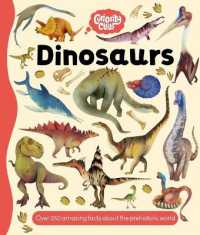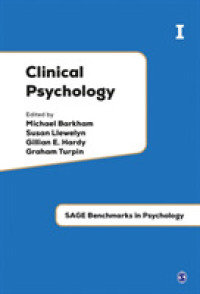- ホーム
- > 洋書
- > 英文書
- > Philosophy
Full Description
What are emotions? How do they arise? How do they relate to other mental and bodily states? And what is their specific structure? The book discusses these questions, focusing on medieval and early modern theories. It looks at a great number of authors, ranging from Aquinas to Spinoza, and shows that they gave sophisticated accounts of human emotions. They were particularly interested in the way we cope with our emotions: how we can change or perhaps even overcome them? To answer this question, medieval and early modern philosophers looked at the cognitive content of emotions, for they were all convinced that we need to work on that content if we want to change them. The book therefore pays particular attention to the intimate relationship between theories of emotions and theories of cognition.
Moreover, the book emphasizes the importance of the metaphysical framework for medieval and early modern theories of emotions. It was a transformation of this framework that made new theories possible. Starting with an analysis of the Aristotelian framework, the book then looks at skeptical, dualist and monist frameworks, and it examines how the nature of emotions was explained in each of them. The discussion also takes the theological and scientific context into account, for changes in this context quite often gave rise to new problems - problems that concerned the love of God, the joy of resurrected souls, or the fear arising in a soul that is present in a body. All of these problems are examined on the basis of close textual analysis.
Contents
Preface
Preface to the English Edition
Introduction
1. A Philosophical Approach to Emotions
2. Why Historical Analysis?
3. A Twofold Transformation
I. Thomas Aquinas: Emotions as Sensual Movements
1. A Simple Explanation?
2. The Soul and Its Faculties
3. The Characterization and Classification of the Emotions
4. The Cognitive Content of Emotions: Fear and Anger
5. How Can Emotions Be Rationally Controlled?
II. John Duns Scotus and William of Ockham: Emotions in the Will
1. Two Kinds of Emotions
2. Pain as a Sensual Suffering
3. Sadness and Free Will
4. The Separation of the Parts of the Soul and Its Consequences
5. Love , Enjoyment and Voluntary Control
III. Michel de Montaigne: A Skeptical View of Emotions
1. A Theoretical Approach?
2. Dynamic Pyrrhonism
3. Applying the Skeptical Method: Sadness, Fear and Anger
4. Is A Systematic Order of the Emotions Possible?
5. Natural Moderation Instead of Control
IV. René Descartes: A Dualist View of Emotions
1. A Mechanistic Theory of Feelings?
2. The Functional Unity of Body and Mind
3. Emotions as Representations
4. Wonder and the Taxonomy of Emotions
5. Self-control through Self-respect
V. Baruch de Spinoza: Emotions as Psychophysical Units
1. A Naturalistic Approach
2. The Metaphysical Frame: Monism and Causal Order
3. Passive and Active Emotions
4. An Intellectualistic and Egoistic Error?
5. A Rationalistic Therapy
Conclusion
Bibliography
Notes








